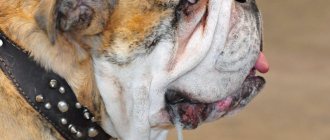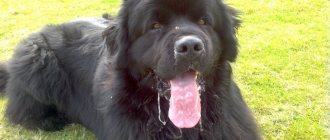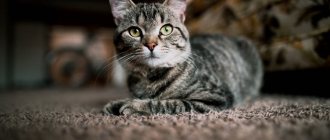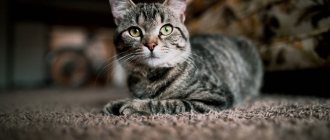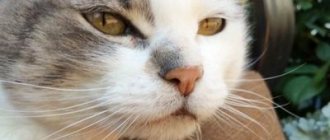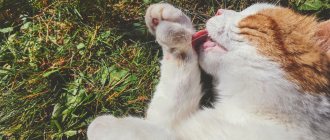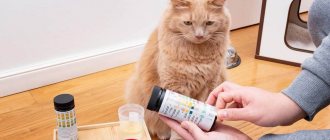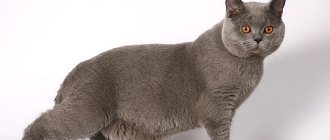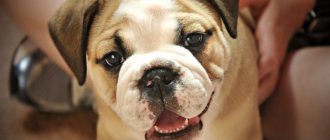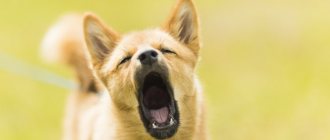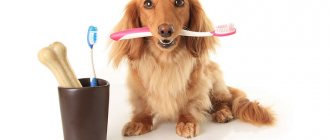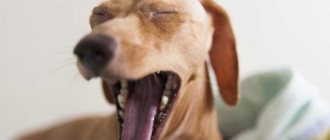Ptyalism is the scientific name for a condition in which a dog experiences increased secretion of salivary fluid. Sialorrhea or hypersalivation develops as a result of hyperactivity of the salivary glands and the production of a specific secretion that has a lot of properties.
The reasons for the development of sialorrhea in dogs can be attacks of nausea and vomiting due to problems with the gastrointestinal tract. Hypersalivation is one of the signs of severe pain tormenting your pet.
Diseases associated with neurology can also manifest themselves as symptoms such as ptyalism (hypersalivation). The salivary secretion produced by the glands begins to flow abundantly from the pet’s mouth. It can be viscous and viscous, or, on the contrary, liquid and transparent.
Factors that provoke hypersalivation are inflammatory processes in the gastroduodenal region, disturbances in the functioning of the hepatobiliary and renal systems.
Malfunctions of the spleen and gallstone disease can provoke nausea and vomiting, manifested by increased salivation.
Hypersalivation may also indicate the development of an allergic reaction that developed in response to an allergen contained in food or air. If characteristic signs of drooling appear, it is recommended to immediately visit a veterinarian.
Causes of hypersalivation
Saliva is the secretion of the salivary glands (sublingual, parotid, submandibular) that enters the mouth. It is a colorless transparent liquid. The role of saliva is its antibacterial effect, protecting the oral cavity from the proliferation of pathogenic bacteria due to the content of antiviral elements in it.
In addition, it helps dogs digest food by moistening hard pieces before swallowing.
The norm for saliva production is 1 liter per day (for a medium-sized dog), but when feeding dry food, more is produced. Exceeding the volume indicates dysfunction of the glands responsible for secretion production. A number of factors contribute to this:
- Dental diseases. Caries, stomatitis, tartar, and periodontal disease cause painful sensations that the body tries to neutralize through copious secretion of saliva.
- Dislocation of the jaw. The dog is unable to close its mouth, causing it to constantly drool.
- Ear diseases. Near the ears are the large parotid glands, which help produce saliva. In the presence of injuries, inflammations, tumors, fungal infections in the ears, the glands begin to intensively produce secretions.
- Viral infections - rabies, parvovirus enteritis, leptospirosis, canine distemper. These are very dangerous diseases that threaten not only the dog, but also its owner.
- Chronic pathologies - diseases of the gastrointestinal tract, liver, kidneys, spleen, gall bladder, ulcers, tumors, gastritis
- Gynecological disorders, for example, diseases of the uterus.
- Poisoning, botulism. A dog can be poisoned by low-quality or heavy foods (fatty meat, sweets), toxic substances (poison, household chemicals), garbage, etc. Penetrating into the stomach, toxic substances irritate the organ and cause an outflow of bile and gastric juice.
- Licking and eating certain types of lizards and toads.
- Stress. A change of residence, separation from the owner, the appearance of another pet in the house, and even a regular trip to the veterinary clinic by car can cause strong psycho-emotional stress and, as a result, hypersalivation.
- Heatstroke. Overheating causes evaporation of saliva, which activates the processes of thermoregulation, increased blood supply to the tongue and hypersalivation.
- Helminthiasis. With helminthic infestation, salivation is accompanied by vomiting.
- Portosystemic shunt.
- Epilepsy. Drooling is usually a warning sign of an epileptic seizure.
- Traumatic brain injury.
- Insect bites if the dog tries to eat them.
- Tumors, cysts of the salivary glands or oral cavity.
- Diseases of the immune system.
Veterinarians also note a number of causes of hypersalivation that are not associated with pathological processes. For example, salivation can be caused by the entry of a foreign body into the oral cavity - fragments of bones, branches, etc. In females, copious saliva is secreted during pregnancy due to hormonal imbalance. In puppies, hypersalivation is observed during the period of teeth change.
Many owners notice increased salivation in their dog when trying to give it medication. And finally, the activity of the salivary glands is activated before eating, after excessive physical activity - these are normal phenomena that do not require medical intervention.
Increased salivation in a dog. Why is drooling so much?
Increased salivation in dogs worries the owners. When there are no signs of disease, you are annoyed by damage to upholstered furniture. Saliva causes allergies in children. If you do not wash your hands, there is a risk of infection with worms and other contagious diseases common to dogs and humans.
In the article, I described 12 causes of increased salivation and recommendations for them. You will learn when severe drooling is normal, and in what cases your pet needs to be treated.
List of the most slobbery breeds.
Which breeds are more susceptible
In representatives of some breeds, hypersalivation is due to peculiarities of the anatomical structure. These are dogs with massive muzzles, loose, fleshy jowls and shortened jaws:
- Shar-Pei;
- Maltese;
- bulldogs;
- boxers;
- Saint Bernards;
- Newfoundlands;
- mastiffs,
- Great Danes;
- Caucasian Shepherd Dogs;
- bloodhounds.
These dogs drool for any reason: in cold or hot weather, before eating, out of joy or excitement. You can often notice saliva on them during sleep. The phenomenon, which is called false ptyalism, is not considered a serious fault of the breed, but many breeders try to prevent dogs that are too “loose” from being bred.
When choosing a puppy, it is advisable to pay attention to its parents. If they are constantly slobbering and getting everything dirty, then their babies will be the same. In this case, all that remains is to accept it and constantly wipe the dog’s face.
When it's ok
Saliva performs the following functions:
- moistens food, helps swallow food;
- has a bactericidal effect when licking wounds;
- protects the body from the ingress of bitter, spicy salty substances and feed, as well as acids and alkalis;
- sorts food and inedible items, which are removed with washing saliva.
- Digestive enzymes break down starch;
- through the evaporation of saliva from the open mouth, the dog is saved from overheating in the heat.
An increase in the intensity of salivation occurs as a reflex response to food intake.
Everything that precedes it - a pleasant smell, the sight of food, the rattling of dishes, the rustling of a bag of ready-made food - helps to separate the secretion. All gnawing puppies constantly produce a lot of saliva; salivation increases during the change of baby teeth.
However, there are breeds that drool constantly . The secret stains the hands of household items and household items. An allergic response develops in children. Dogs of the following breeds are distinguished by drooling:
- boxers;
- Great Danes;
- bloodhounds;
- Saint Bernards;
- bulldogs;
- Caucasian Shepherd Dogs;
- Shar-Pei;
- Newfoundlands;
- mastiffs.
Bloodhounds are characterized by increased drooling.
When working or hunting dogs are overloaded, foam oozes from their mouths. This is saliva mixed with air, which is released so that the dog can cool down. After a short rest, the alarming symptom disappears.
When you return home, your pet may begin to salivate profusely with joy.
Main symptoms
The signs leading to hypersalivation are varied, therefore, the clinical picture will vary. Thus, dental problems are indicated by decreased appetite, careful and slow absorption of food, itching in the jaw area, and drooping head. The dog constantly whines, growls, including at the owner, and reacts inadequately to touches on the face.
When poisoned, the dog experiences severe thirst, vomiting and diarrhea. He often experiences fever and pale mucous membranes. Saliva is thick.
Viral infections are characterized by a sharp decrease in appetite, lethargy, apathy, fever, and increased thirst.
In any case, if hypersalivation occurs in combination with other signs, you should immediately contact a veterinary clinic.
Gastrointestinal problems
Some bowel problems can lead to excessive salivation. Reflux can cause acid to move up into the esophagus from the stomach, irritating it and causing excessive salivation. Many bowel problems also cause nausea, which (as we've already discussed) can also cause drooling.
Megaesophagus is another condition in this category that can cause your pup to drool excessively. This condition occurs when the food tube is enlarged and works less efficiently, meaning it has difficulty moving food down into the stomach.
If your puppy is drooling due to intestinal problems, he may also experience nausea, diarrhea, or a change in appetite. If you notice any of these symptoms, it's time to visit your veterinarian.
Diagnostics in a veterinary clinic
When contacting a specialist, the owner must tell in detail about the dog’s lifestyle, peculiarities of keeping and feeding, contacts with other animals, medications used recently, and other symptoms. The veterinarian’s task is to differentiate normal drooling from salivation, accompanied by gagging and smacking.
To diagnose the disease, the veterinarian will conduct a complete neurological and physical examination of the animal (special attention to the oral cavity and neck area) and diagnostic tests, including a complete blood count (general, biochemical), urine tests, stool tests, ultrasound, x-rays, biopsy ( if a disorder of the immune system is suspected), washings from the mucous membranes.
Treatment method and prognosis
There is no single treatment regimen for hypersalivation. After identifying the cause that caused the excessive secretion of saliva, the doctor develops it on an individual basis, based on the diagnosis, the animal’s health condition, age, etc.
For dental diseases and tumors, teeth cleaning and surgery are used. Removal of a foreign body, if the owner could not get it at home, may require the use of anesthesia and sedation. Antibiotics and antiviral drugs are used to treat oral infections and inflammatory diseases.
If a dog's drooling is accompanied by nausea and vomiting, it is prescribed maintenance therapy with adjustments to nutrition and fluid administration.
As for the prognosis, it all depends on the root cause. If hypersalivation was caused by a dangerous disease such as rabies, which cannot be treated, then the prognosis is unfavorable.
Rabies
It is absolutely essential that your dog receives rabies vaccinations regularly.
One of the classic symptoms of rabies in dogs is excessive salivation. Rabies is a deadly virus transmitted through animal bites. Symptoms include changes in temperament, aggression, changes in facial features and difficulty swallowing.
Luckily, rabies vaccinations are available, so hopefully you don't have to worry about your pooch. If your dog has not been vaccinated against rabies, get it urgently!
What to do at home
The first thing an owner should do if they notice unusual drooling in their pet is to carefully examine the oral cavity. There may be a foreign body stuck there that needs to be removed. If a wound has formed in your mouth, it should be disinfected. A veterinarian's help may only be required if the wound becomes suppurated.
If a dog drools profusely before eating or after excessive exercise, the owner does not need to do anything. As soon as the pet eats or calms down, the process of copious salivation will stop.
If you experience stress caused by traveling in a car, you need to train your dog to travel. It is better to start with small distances, gradually increasing them. This trains the animal's vestibular apparatus. Over time, your four-legged pet will understand that traveling in a car does not threaten him with anything terrible.
It happens that a dog gets very nervous at shows. In such cases, it is advisable to walk him more often, introduce him to other people and animals, and change the environment. It is advisable to seek the help of a dog handler. If the situation is severe, the veterinarian may prescribe sedatives, homeopathic remedies, and herbal decoctions.
If the owner is sure that the dog has been poisoned, he can provide first aid to it using products intended for humans. Activated carbon and Enterosgel are suitable. However, if the symptoms of poisoning do not go away, it is necessary to show the animal to a veterinarian.
Small puppies are always gnawing on something during the period of changing teeth, as a result of which saliva constantly flows from their mouths. No worries. This is a normal physiological phenomenon. When baby teeth are replaced by molars and the gums stop bothering the baby, excessive salivation will stop. The only thing the owner can do to help the puppy is to provide him with as many toys as possible that he can chew.
Injury
Any injury to the mouth or throat can cause excessive drooling. Electrical burns from chewing cables often occur in inquisitive puppies. Other examples include stick injuries or dog tongue biting.
If your dog is injured, you may notice blood-tinged drool and he may make sounds. You may have witnessed an accident, but sometimes your puppy starts drooling for no apparent reason. If you are unsure, the safest thing to do is contact your veterinarian.
Use cable ties and electrical tape to keep electrical cords out of the reach of playful pups!
